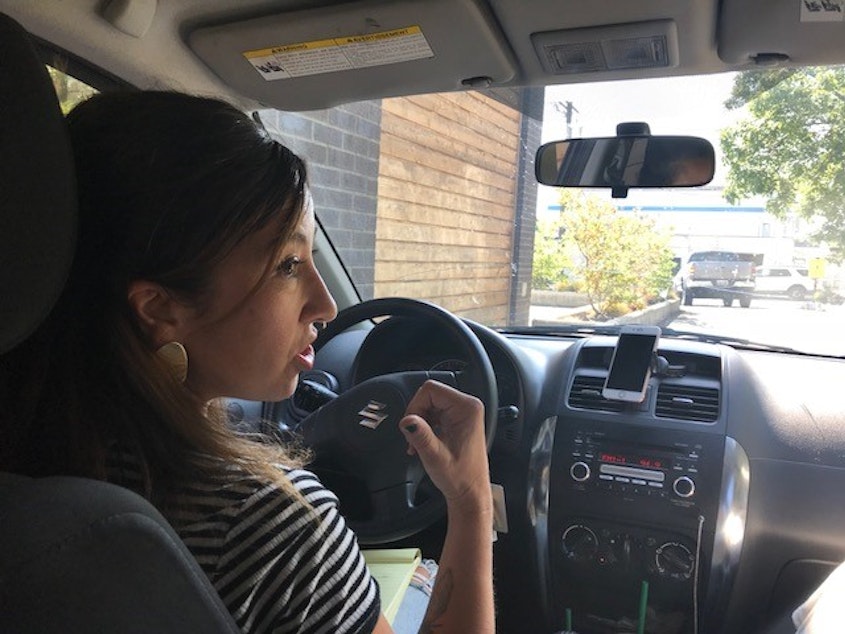9 cases of HIV on Seattle’s Aurora Avenue prompt urgent response

An unusual uptick in HIV infections in North Seattle has been linked to intravenous (needle) drug use.
Public health officials have identified a cluster of nine individuals — all of them homeless.
These cases highlight the challenge to get health services to people who tend to shy away from it.
It’s mid-morning at Aurora Commons in North Seattle, a space with resources for homeless people.
Inside, regulars cook breakfast.
Outside, co-founder Lisa Etter-Carlson talks quietly with a sex worker. She tries to encourage her to visit the mobile medical van parked outside. On Wednesdays, the medical van is for women only.
As they talk, Etter-Carlson gently brushes the young woman’s bangs from her eyes.
The SHE clinic, as it’s called, stands for Safe Healthy and Empowered. It’s a partnership between the Aurora Commons, Harborview Medical Center and Puget Sound Christian Clinic.
Today, the woman doesn’t go in, but Etter-Carlson believes other women might be ready. The clinic has operated for two months and has seen 27 woman, an encouraging number.
“These are woman who don’t seek medical care," Etter-Carlson said. "They do want care. They just don’t feel like they can access care in a typical healthcare setting.”
The new HIV infections have concerned Public Health Seattle King County because they double the average number of cases among heterosexual IV drug users in the county.
The county has responded by expanding access to testing, sterile injection equipment, and condoms.
Condoms aren't always an option, however. The “bad date” postings at Aurora Commons graphically detail how sex workers who walk the Aurora track don’t always get to choose safe sex.
Public health is working with the infected individuals. Officials say there have been no new infections since last week.
By late morning, Etter-Carlson is in her car driving down Aurora with a sex worker named Robin. “We’re just going to go find a dear friend of ours who needs to go see the doc,” Etter-Carlson said.
Robin is worried about a young homeless friend who is five months pregnant. Robin says the new cases of HIV are scary. She started visiting the woman’s clinic about two weeks ago. It was a big step for her, and now, for the first time she feels like she has a primary care provider. “I was a little nervous until I walked in there," Robin said. "They are so amazing they make you feel comfortable right away."
Through the clinic, Robin was able to access PrEP, a pill that would reduce her risk of becoming infected with HIV. She knows other women on Aurora could benefit from the drug.
Needle exchange has been a cornerstone of HIV prevention in Seattle since the late 1980s. As a result, HIV infection rates recently hit a 32-year low.
Public health’s Joe Tinsley runs the downtown needle exchange. He said success is due to relationships formed when people feel comfortable coming in. Tinsley said he treats his customers like a high-end retailer would treat theirs, so they keep coming back.
He aims to have people think, “Whoa, I'm feeling so valued as a person," he said. "Then it reaches a point where, these random people, this middle aged fat guy cares about me. Well maybe I need to take a little more stock in how I take care of myself."
That’s the space, Tinsley said, in which people become empowered to make more healthy decisions.
Tinsley said the spike is significant, and possibly connected to the construction boom downtown. “It sort of pushes people out and pushes people away from services. So when people aren't able to easily access services then things happen when things pop up," Tinsley said.
Back at the Aurora Commons, Lisa Etter-Carlson said she is grateful for the resources coming to the north end since the new infections. “What’s being highlighted right now is the disparity of care," she said. "It’s something that’s not new to us, it’s not new to them."
The search for Robin’s pregnant friend ends at a homeless encampment, but no one is there. Bad timing, Etter-Carlson explains when she returns to the car. “They just did a sweep."
Still, Etter-Carlson holds out hope that the young, pregnant woman will eventually make her way to the Commons.




